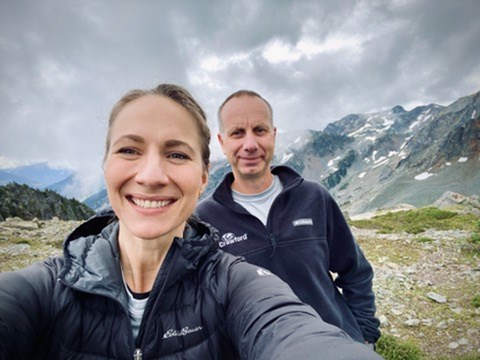A helicopter will soon carry a dozen military veterans into the Whistler alpine for a challenge unlike any they have faced in their careers: managing chronic pain while transitioning back into civilian life.
Tom Hoppe, a military veteran of 20 years who now lives in Sechelt, helped launch the inaugural Military Veteran Alpine Challenge last summer with the help of Dr. Lindsay Rite of CHANGEpain Clinic. On Aug. 19, he will return to the backcountry and hike at least six kilometres with other veterans, some of whom live with chronic pain. Along the way, they’ll find the power of nature, connection and learn how to manage pain.
Veterans from across Canada have applied to join the challenge, which is organized and sponsored by the Chronic Pain Centre of Excellence for Canadian Veterans (CPCoE).
Dr. Ramesh Zacharias, the CEO and medical director of the organization, has worked in the chronic pain field for 19 years. At McMaster University’s Micahel G. DeGroote Pain Clinic, 70 per cent of the people he treats are veterans, Zacharias told Coast Reporter. While 20 per cent of the population has chronic pain, that percentage rises to 40 per cent in male veterans and 50 per cent among women who have served.
“It’s staggering, just absolutely staggering,” Zacharias said of the numbers. He credits the difference, in part, to the military mindset which he describes as a different culture.
“I assess roughly two veterans a week. Most of them have lost hope, because they lost purpose. Part of what we try to do in the chronic pain program is give them hope and purpose,” Zacharias said. That’s where the Military Alpine Challenge comes in.
Before they begin their trek, the participants complete 10 one-hour Zoom sessions run by doctors and clinicians on topics including the science of pain, safe movement, sleep, psychology and breathwork. The education component is key for Hoppe. The participants also work with a physician and physiotherapists to train.
Then the helicopter ride is not only a reminder of their military past, but a goal to work toward. It also helps the group access the alpine quicker.
Veterans leaving military service undergo a transition they may not expect. While some may experience PTSD or chronic pain from injuries, all will have to transition from the military mindset to rejoin civilian life and find a new sense of purpose. Hoppe wants to give participants the space and tools to reflect on how they’ve changed through service.
Hoppe said the military mindset is “Mission first, the regiment second and the self last.That mindset basically sets the person up to push and push and push.” Zacharias said some will not disclose new injuries while serving, because they don’t want to be pulled out of the line of duty. Those who have to leave service for medical reasons — before they’re ready — can become lost, he said.
“If somebody has chronic pain and they’re also struggling with identity, struggling with purpose in life, that can make their pain even worse,” Hoppe said.
Hoppe also hosts The Most Painful Podcast with CPCoE, where he talks to professionals about the most up-to-date research on chronic pain. (A podcast of the same name is also available in French.) Zacharias said the podcasts help the veterans who don’t make it into the chronic pain clinic by letting them know they’re not alone.
Hoppe wants people to know veterans are going through a cultural shift, but that it’s a natural change. And veterans should know more about the mind-body-soul connection, he adds. “You can go to physio and that’s great. It does a wonderful job, but there’s more to it.”
Veterans often suffer in silence after service, Zacharias said, and Canada has fallen short of the moral contract it owes those who serve. After receiving healthcare while serving, many veterans are unable to find a physician after they’re released. Zacharias believes we can do better.
“When I see veterans in the pain clinic, they've, frankly, given up. And so what we've tried to do is to say to them, that just because you cannot serve, doesn't mean you can't have a quality of life. Just because you haven't had a mission overseas. Your mission now is how you can be functional, and have a life with your family as well,” Zacharias said. He added that many veterans are well suited to such goals because they are trained to be disciplined.
“Nobody ever talks about getting rid of the pain,” Zacharias said of the program. “They talk about giving you tools so you can function better, and do the things that you thought you couldn't do again.
Hoppe said he didn’t want the event to just be a one-day hike, but a long-lasting program. After the alpine challenge is complete, they will follow up with the veterans to see how they’re doing. Future events will become a more formal research project, Zacharias said. Hoppe would like to develop the program at a community level and grow it from there.
CPCoE plans to develop a program with athletes and veterans, as the two groups have similar struggles with transitioning from regimented, team-first careers (and prone to injuries) back into regular life. “All the applause, all the awards go. Now you’re back at home by yourself. That’s a complete loss of identity, so the similarities between the two groups are phenomenal,” Zacharias said.
Of seeing the first participants complete the Military Alpine Challenge in 2022, Hoppe said, it “just sent shivers up your spine… It’s great to see that they achieve something.
“If I can get a veteran off the couch and moving out of the house, then maybe they eat better… When you start moving, you feel better,” Hoppe said.



.png;w=120;h=80;mode=crop)